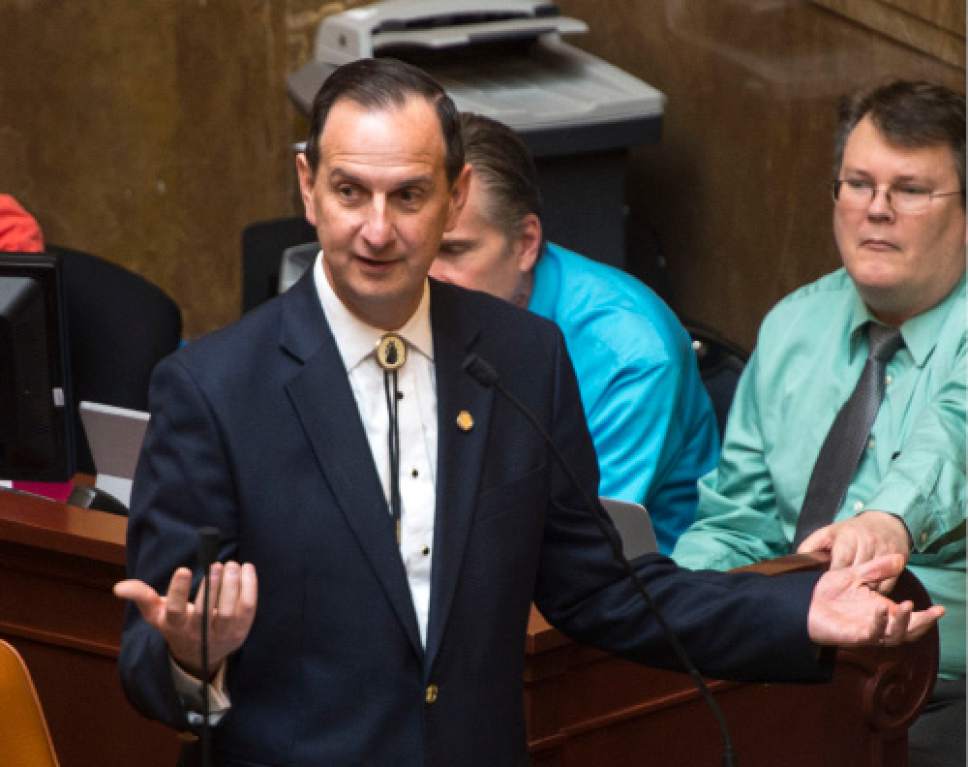This is an archived article that was published on sltrib.com in 2017, and information in the article may be outdated. It is provided only for personal research purposes and may not be reprinted.
Rep. Norm Thurston, R-Provo, says Utah should send a message that drinkers should stop thinking that they can safely drive if they have been imbibing at all, even a drop.
That helped him win the next-to-last approval needed Wednesday for a first-in-the-nation bill to lower the legal limit from driving under the influence to a 0.05 blood-alcohol content (BAC) — which an average male could reach at three drinks, and a female at two.
The Senate Transportation Committee voted 4-2 to endorse HB155, and sent it to the full Senate. It previously passed the House 48-26.
"There is evidence that impairment starts with the very first drink," Thurston said. "That's the problem with our current law. It sends the message that you can drink up to a certain point and then drive…. By the time you get to 0.05, you are significantly impaired."
He noted that more than 100 countries — including nearly all of Europe — already have a 0.05 limit. Thurston said the only countries that do not, besides the United States, are mostly in Africa.
Also, commercial truck drivers in the United States have an even-lower BAC limit of 0.04. Young drivers in Utah may not legally have any alcohol in their blood until they reach age 21.
Bella Dinh-Zarr, vice chairwoman of the National Transportation Safety Board (NTSB), traveled for a second time to Utah to push the bill.
She said studies show that in places with a 0.05 limit, "Everyone still drinks, but they avoid driving after drinking…. These countries drink more per capita than the U.S., but yet they die less in alcohol-related crashes."
She added, "0.05 separates drinking from driving," and estimated it could save an additional 60 lives per year in Utah.
But it was fought by restaurants, libertarian groups and individuals who said it may punish some people who are not truly impaired. And Sen. Jim Dabakis, D-Salt Lake City, argued it could add to a "weirdness factor" for Utah's image that may chase away tourists and new companies.
"It will make criminals out of many of our responsible customers," said Sarah Longwell, managing director of the American Beverage Institute, a Washington-based restaurant trade association. She argued that tougher enforcement in other countries has dropped DUI deaths, not lowering the BAC limit.
"A 0.05 limit is so low that a 120-pound woman could be arrested for little more than one drink," she said. Longwell added that studies show drivers using a hands-free cellphone are more impaired than someone with a 0.05 BAC.
Sen. Stuart Adams said just because people may kill someone by talking on a phone or texting does not mean it should be OK to allow them to do so by drinking, too.
Thurston also doubted the law could punish anyone who is not truly impaired. He said police stop only people who are driving erratically. Then they conduct a field sobriety test — such as walking a straight line. Those who fail are then arrested for driving impaired, and then are tested to determine their BAC.
Dabakis worried that being the first state in the nation to lower the BAC limit would add to what he called a "weirdness factor" for Utah where many outsiders believe they cannot get a drink in the state — which he said chases away tourists and new corporations.
"If we pass this bill, there will be broad and systemic and deep implications for our state. I'm saying, let somebody else pass it and let's see how it works," he said.
Thurston responded, "There will broad, systematic impacts to the families who don't have to deal with a loved one who dies" if it is enacted.
Gayle Ruzicka, leader of the Utah Eagle Forum, said, "It's OK to be weird," if it means leading out for something worthwhile.
"Ifwe're afraid business won't come here because of the weirdness of 0.05, do we want that business? Do we want to be held hostage by businesses that threaten us because of our weirdness, based on the decisions we make to protect our own families?" She added, "Shouldn't we be the first with the right thing to do?"
The bill, if enacted, would not take effect until Dec. 30, 2018. Thurston said that would give extra time to work through any issues. And enactment just before the New Year's holiday would bring extra publicity to the change.



